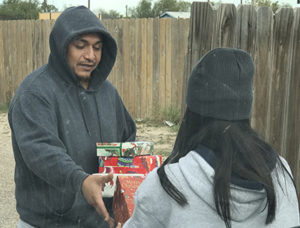Editorial: Welcome to God’s one big estranged family
My son and I are reading through the Bible together on YouVersion’s Bible app. Beyond reading all the way through the Bible, it’s giving us a way to grow our relationship.
Since we’re still in January, we’re not out of Genesis yet. This means we are reading a lot about families and family feuds, which is interesting to read together as a family.
We have talked about how important families and family histories are to God, important enough to include genealogies and family dirt in the Bible.
There’s Cain and Abel, Noah’s sons, Abraham and Lot, Isaac and Jacob, Jacob and Esau, Jacob and Laban, Joseph and his brothers, among others. In each of these relationships, there is an estrangement. In several, there is a bitter dispute and parting of ways.
I am struck by how, from the start, people who started as one family quickly developed a pattern of estrangement. And these are God’s people. These are the people Christians claim as their ancestors in the faith and look to as models of faith. This is the family we join when we become followers of Christ.
This estranged family is the family we invite others to join by becoming followers of Christ.
Welcome to the family, God’s one big estranged family!
Where estrangement begins
Yes, we have followed well our models in the faith. We have found a multitude of things to disagree over. Some of these disagreements have led us to bitter disputes and even separation.
Granted, some of our disagreements are over significant differences. We don’t see eye-to-eye on sexuality or women leading in the church. Some of these disputes can make it hard to sit down and eat together.
Other disagreements don’t rise above the color of the carpet but are fueling our inability to stomach one another. I’m talking about our political differences. Where Christians once seemed able to discuss their political differences with civility, there is disgust. Just look at social media. Or better yet, don’t. Christians are behaving very badly there.
The disagreement is not the problem, however. The problem is that we allow the disagreement to become the center. Once at the center, disagreement becomes a pattern, a habit. It becomes formative. We become known by what we disagree over, because disagreement shapes our behaviors and our relationships. We are so shaped by disagreement that we are dividers in the world, estrangers.
The problem is not that we disagree. The problem is that we disagree to the point of estrangement. And once we separate, we add insult to injury and revile one another. All the while, the world we want to invite into the family of God is watching. No wonder they’re not interested.
Arguing over the family Bible
Our penchant for disagreeing is played out many places, including in our approach to the Bible. We each insist we understand the Bible correctly. To describe our biblical correctness, we may use terms like “faithful,” “traditional” or “orthodox.”
We each claim to be reading the Bible faithfully or to have a traditional or orthodox understanding of the Bible. This is code for: “We’re right. You’re wrong.”
People shaped by disagreement tend not to be willing to give any ground on their degree of correctness, especially biblical correctness. An unintended consequence is an inability to submit to the Scripture they claim as authoritative because they’re too consumed with being right.
By the way, we’re all either susceptible to or guilty of this—fundamentalists, conservatives, moderates, liberals and progressives alike.
Christians say their mission is the Great Commission: “Go and make disciples of all nations …” (Matthew 28:19-20). The problem for Christians comes at the point of “teaching them to obey everything I have commanded you.”
We don’t agree on the particulars of what exactly is commanded, and we stake out our turf accordingly. Rather than submitting to the Scripture, we set up Scripture as a line between us and we post guards so that “none shall pass.”
The lines of biblical correctness become walls. To leave is to betray. To get in is to defile. Estrangement runs headlong into dysfunction.
Rather than being centered on the Great Commission, Christians seem to spend much more time, energy and resources on arguing over who understands the Bible correctly. The result is split after split, schism after schism.
Catholics and Protestants have done it. Lutherans have done it. Presbyterians have done it. Episcopalians and Anglicans have done it. Methodists are doing it. Baptists, well, we’re experts.
All the while, we claim to be going and making disciples, but those we’re inviting to join the family are shaking their heads. They see us more clearly than we see ourselves.
Unbreaking the circle
I can describe where we are, but I’m also caught up in the estrangement. I’ve also considered my reading of the Bible more correct than others. I’ve also struggled to “hang out” with those unlike me. I’m supposed to move beyond description to prescription here, aren’t I?
Here is where I will change the subject.
Each day in the Bible app includes a Gospel reading. Today, we read Matthew 12:1-21, which concludes with a quote from Isaiah 42:1-4:
“Here is my servant whom I have chosen,
the one I love, in whom I delight;
I will put my Spirit on him,
and he will proclaim justice to the nations.
He will not quarrel or cry out;
no one will hear his voice in the streets.
A bruised reed he will not break,
and a smoldering wick he will not snuff out,
till he has brought justice through to victory.
In his name the nations will put their hope.”
Maybe I didn’t change the subject after all.
Eric Black is the executive director, publisher and editor of the Baptist Standard. He can be reached at eric.black@baptiststandard.com or on Twitter at @EricBlackBSP. The views expressed are those solely of the author.


